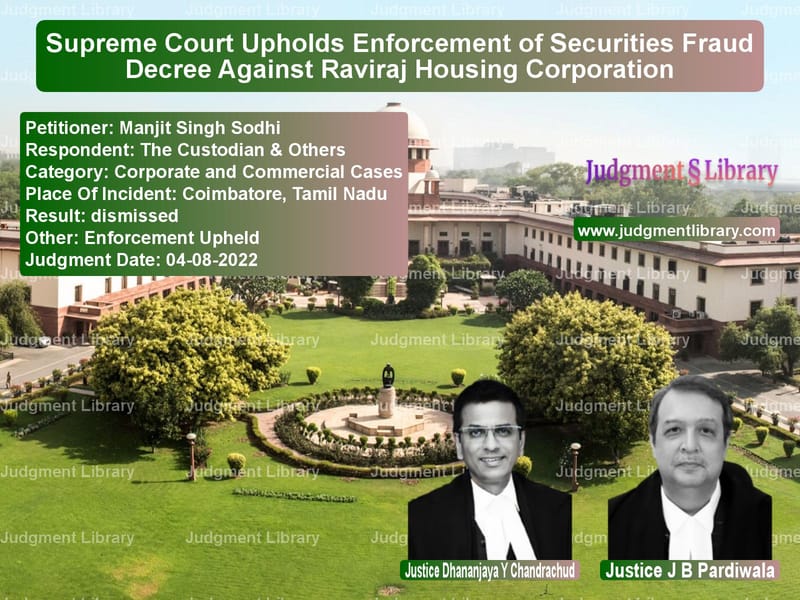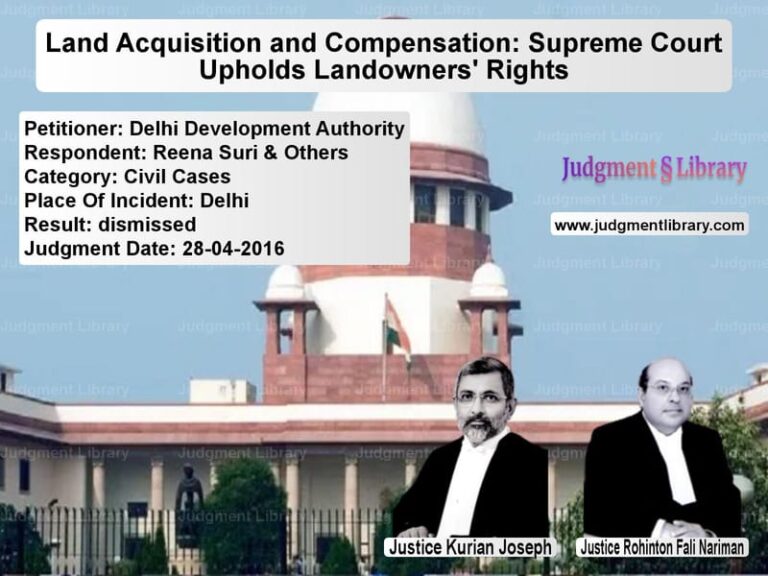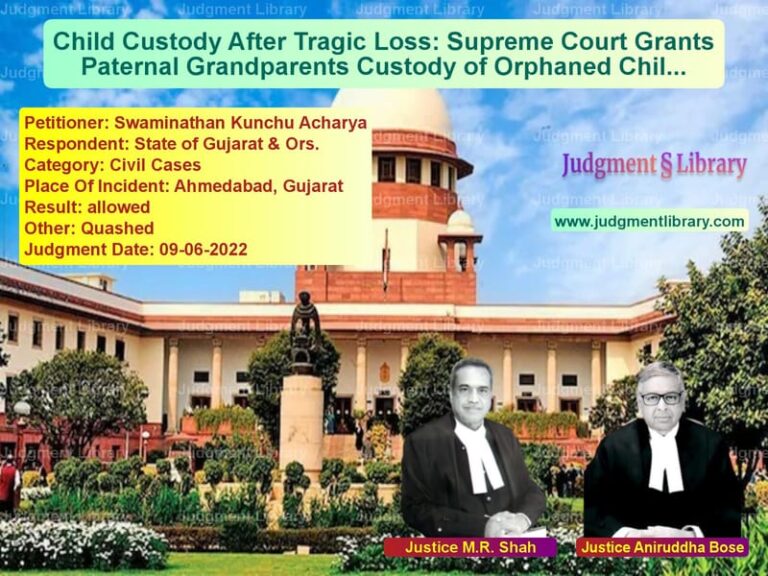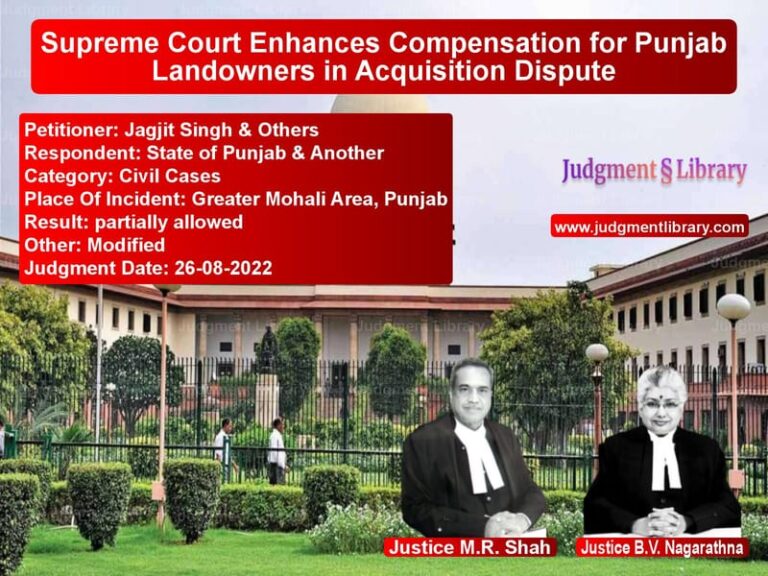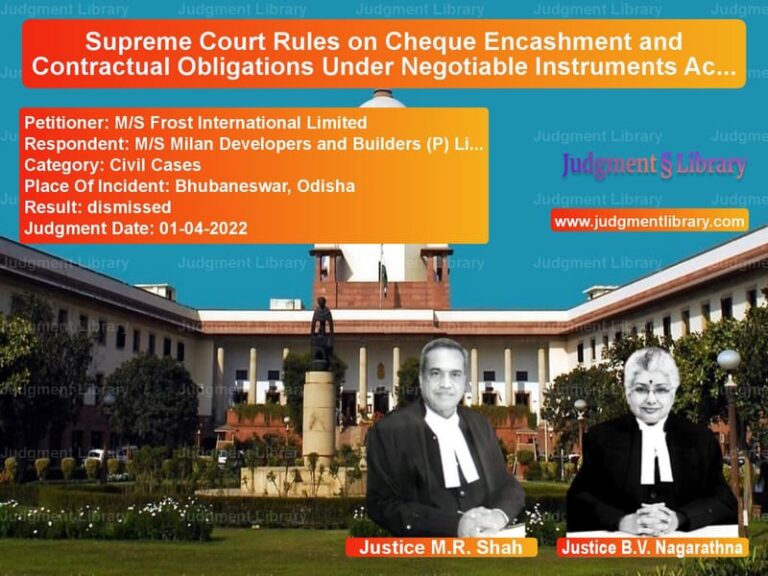Supreme Court Upholds Enforcement of Securities Fraud Decree Against Raviraj Housing Corporation
The Supreme Court of India, on August 4, 2022, delivered a landmark judgment in the case of Manjit Singh Sodhi vs. The Custodian & Others. This case revolved around the enforcement of a financial decree under the Special Court (Trial of Offences Relating to Transactions in Securities) Act, 1992 (hereinafter referred to as the ‘Act of 1992’).
The judgment addressed whether a financial claim against a corporate entity (Raviraj Housing Corporation) and its trustee, Manjit Singh Sodhi, was barred by limitation. The Supreme Court ruled that the execution application filed by the Custodian to recover the outstanding dues was valid and not time-barred. This ruling upholds the powers of the Special Court to ensure the enforcement of financial claims related to securities fraud.
Background of the Case
The case stemmed from an execution application filed by the Custodian against Fairgrowth Financial Services Ltd. (FFSL) and Raviraj Housing Corporation for the recovery of a debt amounting to Rs. 63.86 lakhs, including interest.
Read also: https://judgmentlibrary.com/supreme-court-rules-on-nclt-members-tenure-and-selection-process/
The sequence of events was as follows:
- Raviraj Housing Corporation had borrowed Rs. 25 lakhs from FFSL in 1991.
- FFSL initiated legal proceedings for debt recovery, leading to a decree passed by the Special Court in 2003.
- The Custodian, under the Act of 1992, sought enforcement of the decree.
- Raviraj Housing Corporation’s trustee, Manjit Singh Sodhi, objected, arguing that the execution application was barred by limitation under the Limitation Act, 1963.
- The Special Court ruled in favor of the Custodian, leading to the present appeal before the Supreme Court.
Key Issues Before the Supreme Court
The Supreme Court had to decide:
- Whether the Limitation Act, 1963 applied to execution proceedings under the Special Court Act, 1992.
- Whether Raviraj Housing Corporation’s trustee, who became part of the trust after the decree, was liable.
- Whether there was acknowledgment of liability within the limitation period.
Arguments from the Petitioner (Manjit Singh Sodhi)
The petitioner’s counsel contended:
- The execution application, filed in 2019 for a decree passed in 2003, was barred by limitation.
- As a trustee appointed in 2005, Manjit Singh Sodhi could not be held liable for past debts.
- The acknowledgment of liability relied upon by the Custodian (letters dated February 22, 2018) was beyond the prescribed period of limitation.
Arguments from the Respondent (The Custodian & Others)
The respondents, represented by government counsel, countered:
- The Special Court’s powers under the Act of 1992 supersede the Limitation Act, 1963.
- Raviraj Housing Corporation acknowledged its liability in writing in 2018, extending the limitation period.
- The funds were still recoverable under the Special Court Act, ensuring that victims of securities fraud receive justice.
Supreme Court’s Observations
1. Special Court Act vs. Limitation Act
The Supreme Court held that:
“The provisions of the Limitation Act, 1963, do not apply to execution applications filed under the Act of 1992, as the Special Court has exclusive jurisdiction to enforce claims related to securities transactions.”
2. Acknowledgment of Debt
The Court ruled:
“The letters dated February 22, 2018, acknowledging liability constitute a valid acknowledgment under Section 18 of the Limitation Act, extending the limitation period.”
3. Trustee’s Liability
The Court clarified:
“A trustee managing the affairs of a corporate debtor is liable for debts incurred by the entity, and execution cannot be avoided merely due to a change in trusteeship.”
Final Judgment
The Supreme Court ruled:
- The execution application was not barred by limitation.
- The Special Court’s directive for disclosure of assets was upheld.
- The petitioner’s challenge to the execution proceedings was dismissed.
Impact of the Judgment
The ruling has significant implications:
- Strengthens the enforcement of securities fraud claims: Ensures that financial decrees under the Special Court Act are effectively enforced.
- Limits defenses based on limitation periods: Clarifies that acknowledgment of liability can extend the limitation period.
- Ensures accountability in corporate debt recovery: Establishes that trustees managing corporate entities are responsible for outstanding debts.
Conclusion
The Supreme Court’s ruling in Manjit Singh Sodhi vs. The Custodian & Others reinforces the enforcement mechanisms under the Special Court Act, 1992. It ensures that corporate fraud cases do not escape legal scrutiny due to technical defenses, thereby safeguarding financial interests and regulatory frameworks.
Petitioner Name: Manjit Singh Sodhi.Respondent Name: The Custodian & Others.Judgment By: Justice Dhananjaya Y Chandrachud, Justice J B Pardiwala.Place Of Incident: Coimbatore, Tamil Nadu.Judgment Date: 04-08-2022.
Don’t miss out on the full details! Download the complete judgment in PDF format below and gain valuable insights instantly!
Download Judgment: manjit-singh-sodhi-vs-the-custodian-&-othe-supreme-court-of-india-judgment-dated-04-08-2022.pdf
Directly Download Judgment: Directly download this Judgment
See all petitions in Corporate Governance
See all petitions in Debt Recovery
See all petitions in Bankruptcy and Insolvency
See all petitions in Judgment by Dhananjaya Y Chandrachud
See all petitions in Judgment by J.B. Pardiwala
See all petitions in dismissed
See all petitions in Enforcement Upheld
See all petitions in supreme court of India judgments August 2022
See all petitions in 2022 judgments
See all posts in Corporate and Commercial Cases Category
See all allowed petitions in Corporate and Commercial Cases Category
See all Dismissed petitions in Corporate and Commercial Cases Category
See all partially allowed petitions in Corporate and Commercial Cases Category

